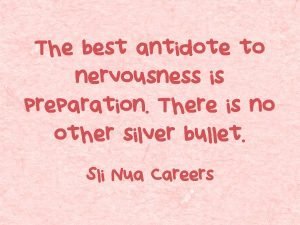By Liam Horan, Career Coach & Managing Director, Sli Nua Careers

Q: I get nervous before interviews. By the time I get to the venue, I’m shaking. It really holds me back in my career. Any suggestions? (SC, email).
A: First of all, accept that you will have nerves. Nerves are not a bad thing, per se. All great sports people are nervous before events; singers, actors, anybody who puts themselves out there, no matter how accomplished they may seem to you looking in from the outside, no matter how often they have done it before, still experience nerves, writes LIAM HORAN, CAREER COACH, SLI NUA CAREERS.
 In fact, many sportspeople say that the longer you go on the more nervous you become. So the trick is not to expect to have no nerves but to understand that if you do your preparation, your nerves are more likely to dissipate. Take the case of a sportsperson. They are asked to go into the arena and kick a penalty, for example, or they are asked to box in a major fight.
In fact, many sportspeople say that the longer you go on the more nervous you become. So the trick is not to expect to have no nerves but to understand that if you do your preparation, your nerves are more likely to dissipate. Take the case of a sportsperson. They are asked to go into the arena and kick a penalty, for example, or they are asked to box in a major fight.
The fact that they have prepared to do that very thing helps them to conquer their nerves. They know that when the bell goes, when the whistle is blown, they are ready for the off because, ultimately, they are comfortable doing what they are being asked to do: trying to reproduce a skill they have fine tuned many times on the training ground and one they have also used previously in competition.
And, so, to the parallel for job interviews. If you have done your work, if you have got your examples together, if you have practised doing answers, if you know what the job spec is all about, if you know what the employer is looking for, your ability to overcome your nerves is greatly enhanced.
You are going in to talk about something you know. If, however, you don’t know what the job is all about, if you don’t have the previous experience or the education or training they are require, then your nerves may become more and more of an issue. You have nothing in your arsenal to defeat or transmute the nerves: you go unarmed into combat.
The best antidote to nervousness is preparation. There is no other silver bullet. A practical tip if nervousness – or shyness – makes it difficult for you to maintain eye contact: look the interview panel members not in the eye, but on the chin. They will never know you are not looking them directly in the eye. It is one less pressure point for you to worry about on the day.
In terms of hand movement, if you typically use your hands to talk, so to speak, you should use them to talk in the interview as well. It is not a good thing to interfere with your natural communication style in the interview because it will kill your flow. Hand movements help to burn off nervous energy too.
Don’t try to put on a ‘voice’. Trust your natural communication style. If you try to do things that don’t come naturally to you, you will put greater pressure on yourself and that, in turn, will exacerbate your nervousness.
Finally, no matter how big the opportunity, or how long you have waited for it to arise, it is still ‘only a job.’ Try to keep things in perspective. Don’t let it overwhelm you.
If you would like to make a booking with any of our career coaches, see HERE for CV Preparation and Interview Training.
If you would like to make a booking with any of our career coaches, see HERE for CV Preparation, Application Form writing, LinkedIn Profile writing, Interview Training and other career services.